At the beginning of January, Migrant Women Press met the Iranian singer, songwriter, and music producer Farzane Zamen at Glasgow Women’s Library, where she works as Production Coordinator. Farzane is from Tehran and has lived in Glasgow since 2017.
While our conversation happened, all the world’s eyes were on Iran. Farzane explained about her music and what “Women, Life, Freedom” means to her. She also shared her thoughts on how Western media cover issues in the Middle East. On 20th April, Farzane launched her new album, a project called “Reviving Folk Songs of Azarbaijan” “to pay tribute to my oral tradition and re-create the songs I only remember from my parents and grandparents singing them”, she explained.
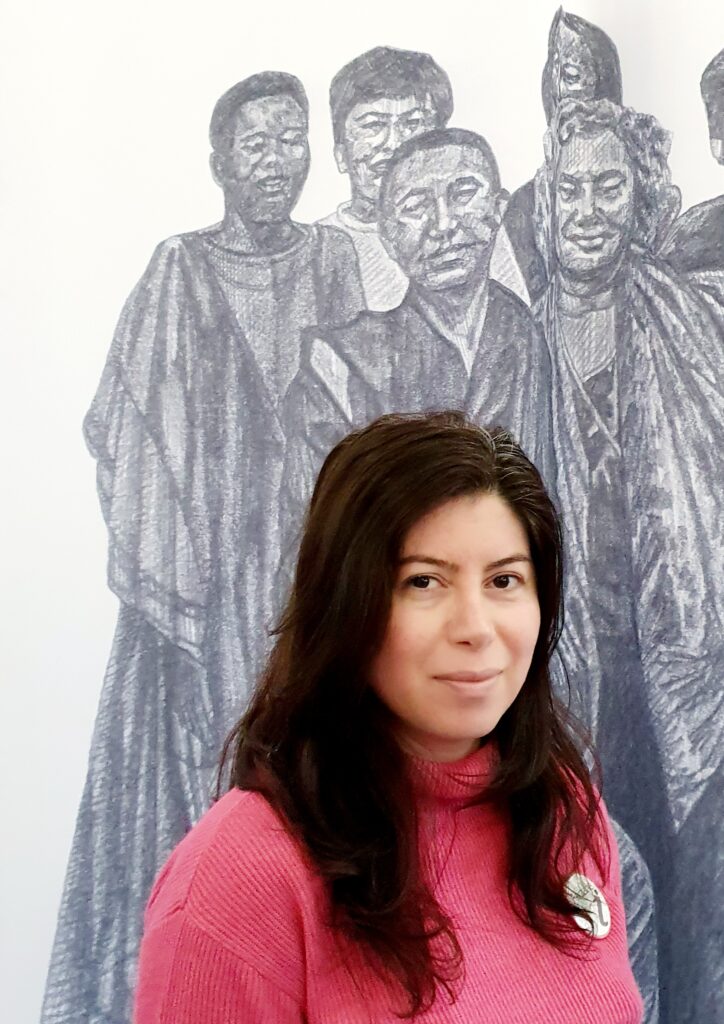
Interview with Farzane Zamen
by Juliana da Penha
Migrant Women Press: How was it to be a musician in Iran, and then how is it to be a musician in Scotland?
Farzane Zamen: It’s an entirely different experience. One thing has been similar: my passion. But being a musician there (Iran) was like being hidden because of the ban after the Islamic… I don’t want to call it a revolution. So, after the Islamic riots in 78, they started to limit many things for women, and one of the things was a ban on a woman’s solo voice.
I started playing the guitar and was interested in songwriting when I started music. When I started writing songs, my dad suggested that I could sing the songs I was writing.
I didn’t know what it would be like to work in an environment where you are banned, but I did it anyway. I wrote lots of songs, and I started singing and recording them.
I learned a lot of things, but it was like an underground scene where you had to negotiate with many people who didn’t know you and didn’t value your work enough because my music wasn’t mainstream pop.
MWP: Why did you come to Scotland?
FZ: The music was the reason I came here. I was awarded the Artist Protection Fund, from the United States, under the International Education Institute. I had a six-month residency when I came here, and I produced an album about Middle Eastern women suffering from discrimination.
Since then, I started to be a different person as a musician, performing in public spaces, having other set lists when I was singing, and singing my own songs alongside Iranian folk songs. It was a mix of musical colours in my performance.
I feel like I exist more here. I like in-person events and performing in gigs. It gives me a different level of existence when I compare it to when I was back in Iran, which was mostly limited to sitting behind my computer and my equipment and producing music in my own room. Here is a more open space for me.
I didn’t know what it would be like to work in an environment where you are banned, but I did it anyway.
MWP: It looks like the meaning of underground here is entirely different from what you describe in Iran’s underground music scene.
FZ: Yes, in Iran, underground means underground (laugh). You don’t even have access to contracts and can’t officially publish or sell your music. But you’re also hidden as a musical character and a singer. And you have to hide; you better hide. You shouldn’t be too bold.
MWP: What did you miss more from Iran?
FZ: I miss my family so much because I haven’t been able to see them in more than a year now. And then I miss Tehran so much; it’s my hometown.
I miss my life there; even though I lived under the Islamic regime there, I miss it so much. I don’t miss the system, but I miss the experience of living there. I miss the homeland. Even though it’s been under the control of the Islamic regime after the Islamic riots and 78. But it is still my homeland, and I miss it.
MWP: All your family there? You are alone here?
FZ: I don’t have any family members or relatives in the UK. All of them are in Iran, my parents, my sister, our dog, and all my relatives.
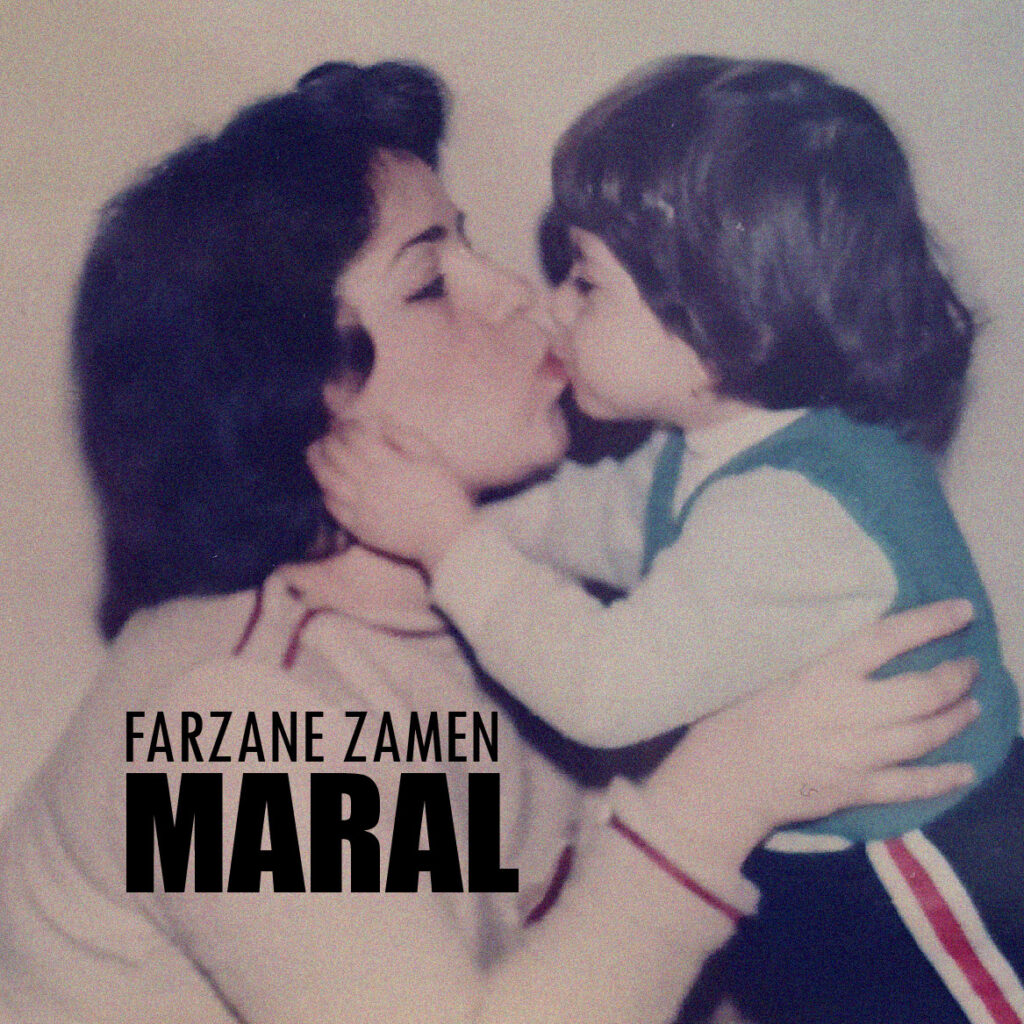
Image Credit: The mother and daughter photo: Album Cover, Farzane and her mum when she was 2 years old. Photo taken by Farzane’s father
MWP: What do you express in your music? How do you define it?
FZ: Regarding the genre, my music is alternative, but it has pop aspects. But compared to the mainstream pop music in Iran, it doesn’t fit that at all.
The subjects, language, and lyrics are a bit different; it’s from a woman’s perspective. I’ve written love songs; I’ve written socially related songs. I have written a song about leaving your homeland to make a better life in a different country, but you’re not sure about it. I have other songs about social problems. It’s a mix of different things.
MWP: Do you think music and other creative expressions can be a way to support the struggle of people in Iran?
FZ: Absolutely, it has a significant role. I also created a song for the recent movement “Woman, Life, Freedom”, and I haven’t been able to publish it yet, because I didn’t want to use my own name there. I want to be anonymous in that song. I made a video, and sending it to publishers or TV channels is difficult.
There have been many songs written during the past few months, but there’s a big problem; from my point of view, most of them are sad songs. And I think we don’t need them now.
We might need them in future, but now we need kind of energetic, supportive, cheerful songs.
My song was kind of a revolutionary piece; it is very positive, supporting everybody participating in this Revolution and helping the movement grow.
Music has an effect, but most of the songs being disseminated are so sad that I think they’re not helping because it kills people’s hope.
We shouldn’t waste our time now, crying and mourning; we could do it later. We should keep fighting.
Music has an effect, but most of the songs being disseminated are so sad that I think they’re not helping because it kills people’s hope.
MWP: How is the situation in Iran now, especially for women?
FZ: Right now, that I’m talking to you, in January 2023, things have gone so bad because the regime is trying to oppress. People are threatened by mass executions.
Many young people are being executed without fair trials and access to a proper lawyer, so it’s very depressing. To be honest, it’s working because it makes people hopeless.
But I think it will work for a short period.
But about women, right now, I’m not there, I don’t have a clear idea of how they’re feeling. However, because I talk to my sister quite regularly, she lives in Tehran, and she says that many women don’t wear the hijab anymore.
They don’t wear their hijab at all, and it’s pretty unique. It hasn’t been like this before; they’ve been courageous.
There’s been an order to harshly treat women who don’t wear hijab. So, this will be a new series of conflicts with the people, but this can’t last forever.
It doesn’t mean freedom; it’s just women showing their middle finger to the regime.
But the conflicts, the revolution, the economic crisis, everything together with mass executions, this enormous depression because of the bad news, many prisoners being tortured and many waiting to be executed, is too extreme. It’s harsh, and everybody is having a hard time, women and men altogether. Inside and outside of Iran. But mostly inside.
I cannot imagine what they are experiencing there. We are just witnessing what’s happening through social media, and sometimes I feel guilty because everyone who’s been tortured or killed is dying because of me; they are doing it for a better future for all of us.
I have this feeling, thinking, why I’m not there to be part of that? But there is a risk that could go up to your life. You could lose your life if you go back there and fight. It’s such a difficult situation.
You take part in rallies here. You do whatever you can, which is very important, but it’s not the same.
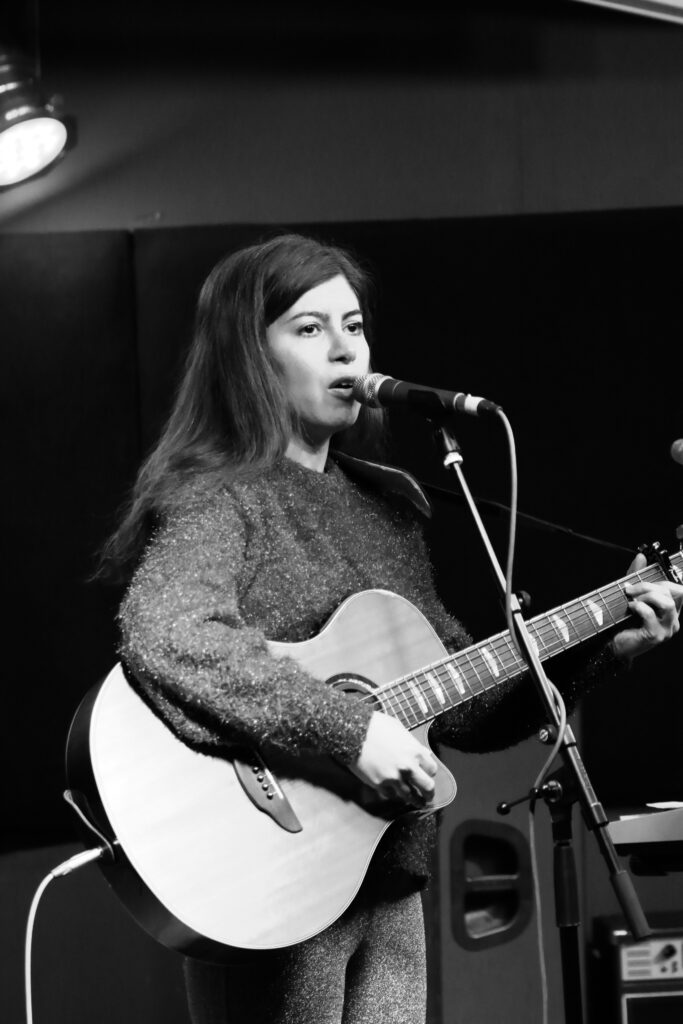
Farzane Zamen at the Glad Cafe, Glasgow 2018
MWP: What do you think can be the role of the Iranian diaspora in this revolution? What Iranians leaving abroad can do to contribute to their struggles there?
FZ: What the Iranian communities have been doing outside of Iran has been
unbelievably amazing, very significant. All the rallies, tens of thousands of people, in many cities, weekly going to rallies, creating this world awareness, everyone knows what’s going on.
And it has created a lot of pressure on the world’s governments to treat differently to the regime, and it’s working. I think this time is so different, and their support has been so good, and it’s still going on.
MWP: What do you think about this support of the international community and international media? Do you think it’s also effective, or what could they do better?
FZ: I think they can definitely do better than this. I personally don’t trust all of the mainstream media. I’ve seen a tremendous amount of news manipulation, changing the subject, changing the topic, subjectively choosing a title that affects the reality, so they can edit the reality, playing out with words, playing out with what image to use.
For example, one of the actresses in prison recently, Taraneh Alidoosti, a very famous, high-profile actress, joined the movement by showing “Women, Life, Freedom” with a photo of herself without hijab, holding that slogan. After this, she was arrested and imprisoned for a few weeks. She was released last week, and many photos of her that we saw when she came just outside the prison were without hijab. But when you saw it in a mainstream journal, they used a photo of her when she had a headscarf. This kind of thing angers me because they are trying to show a different fact. They want to manipulate reality.
They are not telling the truth.
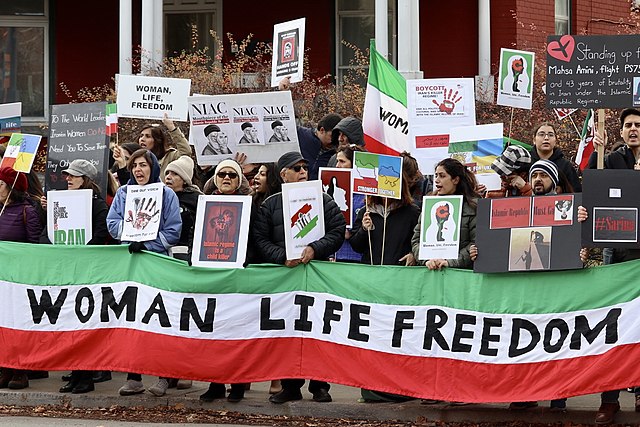
Image credit: Taymaz Valley
MWP: You hosted an event last November in Glasgow supporting the “Women, Life, Freedom” revolution in Iran. How was this event?
FZ: I was going to rallies organised by the Iranian community in Glasgow, but I noticed it was too general.
It’s good to create awareness; taking any step and helping this revolution is valuable, as when we go outside and shout slogans, sometimes half in Farsi and half in English, and there are lots of Iranian people coming.
But I saw the need for a more meaningful connection and communication with the Scottish community, and with the Glaswegian community. Sometimes it’s good to just go to a more intimate space and communicate what’s happening through arts and talks and various performances.
So, I engaged local people differently, in a more meaningful way, closely. Much more closely than rallies because when they happen in the city centre, many people pass by and see what’s happening, but many of them might not really stick with it. They might just pass it.
Sometimes it’s good to just go to a more intimate space and communicate what’s happening through arts and talks and various performances.
In that event, everybody who joined and performed and had a talk or poetry joined as a volunteer.
The venue was Glad Café, in Glasgow Southside, and they didn’t charge us at all and offered the sound engineer.
It was a great night; I organised it in two weeks, and more than 60 people showed up, which was fantastic.
I started singing a few songs, and then there was poetry and more music. I made a presentation explaining what’s happening, mentioning the mainstream media lies and how they change reality by manipulating the words.
But it was challenging; I felt so exhausted after the event. I haven’t been able to do more since then.
I created a video and produced music, but I am struggling to share it because I want to be anonymous.
Otherwise, I could easily upload it to my own YouTube or Instagram channel. But I need to protect myself from future threats that might happen.
MWP: Do you frequently use anonymity for some of your productions?
FZ: Only for this one because this one is directly addressing the current movement. All my other works, even the socially related songs, have been under my name.
But this one, for some reason, I feel I’m scared. I can’t lie about it. I am scared.
What if the regime doesn’t get overthrown any time soon? I hope it doesn’t happen. What if I want to go to Iran and something like what happened to Nazanin Zaghari-Ratcliffe happens to me? She was in prison for five years. Anything can happen now.
If they really want to find a person, it’s easy for them because there are not many Iranian female singers because of the limitation and the ban.
And it’s all because of my family. If my family members were not in Iran, I would do much more than this. I just feel unsafe.
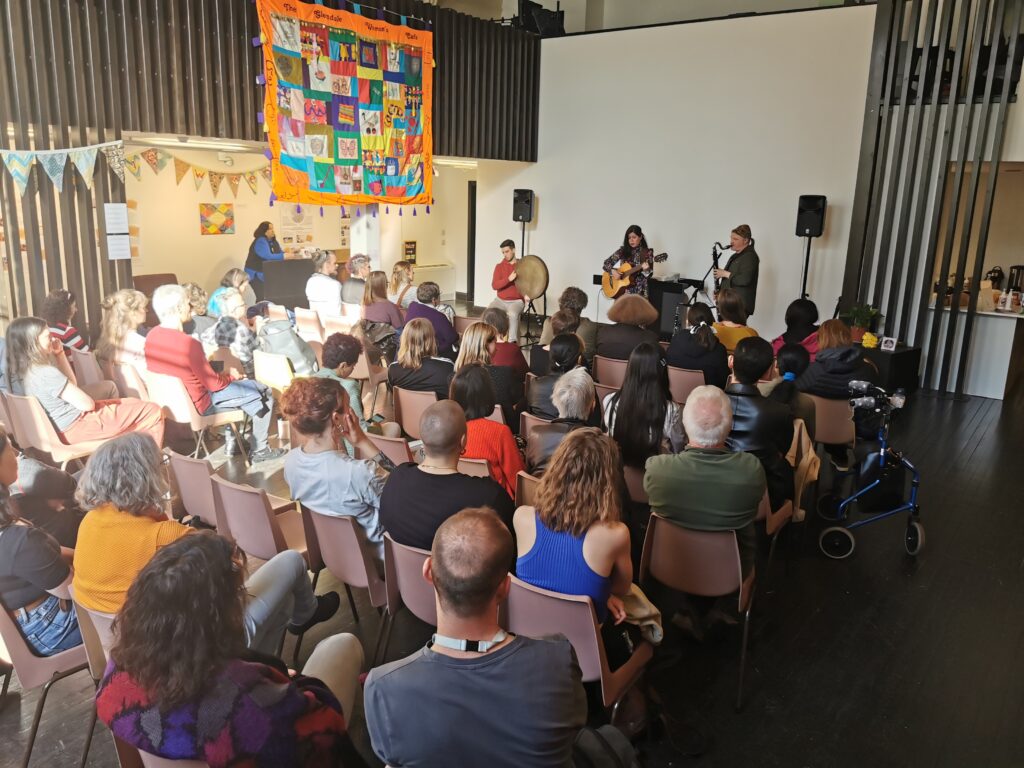
Farzane Zamen album’s launch at Glasgow Women’s Library, April 2023
MWP: What is your dream for Iran and Iranians?
FZ Freedom, democracy, a healthy democratic political system that respects all the people of Iran, genders and all ethnicities. Everyone will have the life they deserve and be who they really are.
A bright future! that’s what I want for my country. That’s what I dream, and if it comes true, it will be the best day of my life.
Updates: We spoke with Farzane again at the end of April, asking her more questions about the situation in Iran now and also about her new album, which she launched on 20th April at Glasgow Women’s Library.
MWP: What can you say about the situation in Iran now?
FZ: Things might seem quieter as demonstrations aren’t happening like months ago, but the revolution is still going on; we see courageous women walking without the compulsory Islamic dress code in the streets even though the regime’s bullies and plain clothes keep attacking them. Shops and shopping centres are being forced to shut because of breaking their rules. This is huge, and the solidarity within our nation is brilliant.
MWP: When we met, there was massive media coverage of the situation in Iran. What do you think about how the Western media now covers the Iranian situation?
FZ: I’m quite pessimistic about Western mainstream media; they prefer staying quiet. There was coverage of chemical attacks on girls’ schools simply because it’s huge, and if they don’t cover it, that would be awkward! The West prefers dictatorship for our country and conflict for the whole Middle East; it’s good business for them. The unsafe Middle East means they will have more control over our lands and resources and obviously sell more weapons. They control the media as well; that’s why I think the media is so in harmony with those gangsters in power.
I’m quite pessimistic about Western mainstream media; they prefer staying quiet.
MWP: You mentioned you were producing a new album, which was launched on 20th April at Glasgow Women’s Library. Could you tell me more about it?
FZ: It’s a project called “Reviving Folk Songs of Azarbaijan” to pay tribute to my oral tradition and re-create the songs I only remember from my parents and grandparents singing them.
I’m happy to announce that I had my album launch at Glasgow Women’s Library, and it went well; it was a mixed event, a video screening of community engagement about folk songs and musical memories. I performed with a band, discussed my experience with the head of Equality and Diversity in Creative Scotland, and attended an open mic session. I made it really complicated, but I’m pleased about it. I sold almost 30 physical copies, and I will record three more songs; after that, the album will also be available online.
Do you want to add anything?
Thanks for showing interest in Iran’s situation and talking to me about it. What you do is very important as we are still called minorities. Our voices should be heard more; hopefully, one day, we will be considered a part of Scotland’s majority.
Farzane Zamen’s new album copies will be available at Glasgow Women’s Library for the next two weeks until May 13th 2023.
Instagram: @farzanezamen
Twitter:@farzanezamen
Facebook: fb.com/farzane.zamen
Youtube: https://youtube.com/@farzanezamen